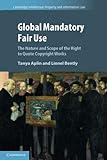Global mandatory fair use : the nature and scope of the right to quote copyright works / Lionel Bently, University of Cambridge; Tanya Aplin, King's College London.
Series: Cambridge intellectual property and information lawPublisher: Cambridge, United Kingdom ; New York, NY : Cambridge University Press, 2020Description: xxv, 253 pages 22 cmContent type:- text
- 9781108812801
- 346.0482 23
| Item type | Current library | Shelving location | Call number | Materials specified | Status | Notes | Barcode | |
|---|---|---|---|---|---|---|---|---|
 BOOKs
BOOKs
|
National Law School | General Stacks | 346.0482 APL (Browse shelf(Opens below)) | PB | Available | Recommended by Dr. Betsy Rajasingh | 39636 |
Browsing National Law School shelves,Shelving location: General Stacks Close shelf browser (Hides shelf browser)
Includes bibliographical references and index.
History of Article 10(1) Berne -- Preliminary considerations about the nature of the quotation exception -- Article 10(1) Berne : requirements -- Article 10(1) Berne : the meaning of quotation -- Article 10(1) Berne : fair practice -- Consequences of global, mandatory fair use -- Conclusion.
"Imagine an international instrument which does not merely oblige contracting parties to confer rights on copyright holders (permitting only optional, narrowly circumscribed, exceptions), but also mandates limitations. Imagine, too, that such an instrument requires parties to permit use of material which has been taken from existing works and incorporated in a later work, irrespective of the purpose of so doing, but only on condition that the use is in accordance with fair practice. Imagine that the mandatory limitation allows re-use of transformed versions of works, including parodies, and even the whole of a protected work. Imagine, indeed, a regime of global, mandatory, fair use. Surely such a fantasy, or 'thought experiment' is a pointless, 'academic' exercise given the political economy of international copyright and the dominant place within it occupied by the socalled 'three-step test,' which has long been thought to cast a cloud over the legitimacy of the US fair use defence?1 Yes and no. Yes, it is pointless to imagine, but no, this is not because it is impossible to achieve; it is pointless to imagine because there is no need to imagine it. It already exists.2 This is precisely the effect of Article 10(1) of the Berne Convention.3 This much-neglected provision already mandates global fair use.4 This is a proposition that will seem shocking to some, on both sides of copyright's polarised political spectrum. To so-called 'maximalists,' global, mandatory fair use is unthinkable because US fair use is itself legally dubious, in the light of the international requirement that exceptions must be confined to certain, special cases. Section 107 of the US Copyright Act 1976 is only maintainable because there is a body of jurisprudence that transforms the open norm of fair use' into a series of reasonably clearly understood and well-defined instances. Adoption of such an open-norm by other jurisdictions, without such jurisprudence, fails to offer certainty as to the limited scope of the limitation that international law appears to demand. At the opposite end, that of the 'copy-left' movement, the proposition cannot be correct, because, were it so, the international acquis would not be as appalling as it is taken to be"-- Provided by publisher.
There are no comments on this title.






